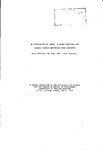AN EVALUATION OF CREST, A NIGHT HOSPITAL FOR ELDERLY PEOPLE SUFFERING FROM DEMENTIA
| dc.contributor.author | WATKINS, MARY | |
| dc.contributor.other | Faculty of Health | en_US |
| dc.date.accessioned | 2013-11-04T11:17:57Z | |
| dc.date.available | 2013-11-04T11:17:57Z | |
| dc.date.issued | 1994 | |
| dc.identifier | NOT AVAILABLE | en_US |
| dc.identifier.uri | http://hdl.handle.net/10026.1/2561 | |
| dc.description.abstract |
The aim of the study was to evaluate the effectiveness of a night hospital nursing service for elderly people suffering from dementia; in particular, to establish the appropriateness of night support for this group and their carers. The study developed as a result of previous work that demonstrated that some carers requested "inpatient" admission for their relative/friend because of the stress of providing support and supervision at night. The research methods involved an evaluative structure - process - outcome, quality assurance and case study approach. An operational policy for the service was drawn up, as were nursing standards (process) . The service was evaluated over a two year period. Patient outcomes were measured using a visual analogue scale at intervals over six months to identify behavioural changes. Similarly, carers' feelings of anxiety and coping ability relating to their caring role were measured. Changes in patient behaviour and carer anxiety and felt ability to cope were analysed using the Wilcoxon matched-pairs signed ranks test. Carers were interviewed to elicit the effects their relatives' attendance at CREST had on their day to day lives. Changes in the use of community care services as a result of CREST were also identified. The sample consisted of 38 patients and their informal carers. Nursing activity was observed using non-participant observation to establish both the type of activity and peak work load periods. The results demonstrate that CREST had a positive outcome in terms of supporting patients' carers and that patients' behaviour did not change significantly while attending the night hospital. This latter result has been interpreted as a positive outcome in that people suffering from dementia can be expected to deteriorate over time. In conclusion it is anticipated that the results of this study have significance for planning nursing services for the care group involved and should assist in identifying the number and grade of staff needed to deliver optimum care at night to elderly people with dementia. Recommendations for changes in the operational policy have been made which will assist managers in planning new services. The research suggests that new nursing services for this group in the health authority will be more closely related to the individual needs of patients and their carers than has been achieved hitherto. This strategy should lead to fewer patients needing long term in-patient care. | en_US |
| dc.language.iso | en | en_US |
| dc.publisher | University of Plymouth | en_US |
| dc.title | AN EVALUATION OF CREST, A NIGHT HOSPITAL FOR ELDERLY PEOPLE SUFFERING FROM DEMENTIA | en_US |
| dc.type | Thesis | |
| plymouth.version | Full version: final and full version as approved by the examiners at the time of the award of your degree | en_US |
| dc.identifier.doi | http://dx.doi.org/10.24382/3664 |
Files in this item
This item appears in the following Collection(s)
-
01 Research Theses Main Collection
Research Theses Main


